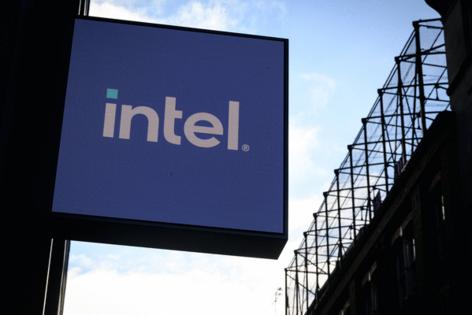Intel flirts with historic weekly gain on partnership rumors
Published in Business News
Intel Corp. shares are on track for their biggest one-week gain on record, as reports of a potential partnership with a key rival fueled bets on a turnaround after an extended period of weakness.
The chipmaker has risen as much as 32% this week, which would represent its strongest such jump in its more-than-40-year history, according to data compiled by Bloomberg that goes back to 1982. On Friday, though, the stock was down 3.1% as of midday New York time, reducing the weekly gain to about 23%, the biggest since January 2000.
Even after the recent gains, the shares are only back to where they were in early December, and the advance has done little to offset last year’s 60% collapse.
Much of the gain came on reports, including one from Robert W. Baird & Co. analyst Tristan Gerra, that the U.S. government could potentially get involved in a plan involving both Intel and Taiwan Semiconductor Manufacturing Co.
TSMC is the largest provider of outsourced chip production serving companies such as Apple Inc., Nvidia Corp. and Advanced Micro Devices Inc. Its advances in manufacturing — which have surpassed Intel — have allowed its customers to take market share gains from the American company.
“TSMC would send engineers to Intel’s 3nm/2nm fab, applying the company’s know-how to insure that fab and subsequent manufacturing projects from Intel become viable,” wrote Baird’s Gerra, who cited discussions from the Asia supply chain. The fabrication plant “could be spun off into a new entity jointly owned by TSMC and Intel, and run by TSMC,” with the entity receiving funding from the U.S. Chips Act.
Representatives for Intel and TSMC declined to comment on the reports of a possible partnership.
Daniel Newman, chief executive officer of The Futurum Group, said “the idea of some kind of partnership is very bullish,” although he stressed it wasn’t confirmed.
“I think a lot of talks are happening, but I don’t have confidence in every rumor. Still, the stock is so battered down that people are looking for a catalyst.”
He noted the stock is trading near book value, suggesting “deep value here, though it comes with considerable risk because the turnaround isn’t done by any means. Still, people entering here are making a small bet at a low valuation that maybe a partnership comes to fruition, maybe it gets a CEO who changes the calculus, or maybe the worst is behind it.”
Though it is a longtime market leader in the semiconductor sector, Intel has struggled for years, especially as the industry’s focus turned to artificial intelligence accelerator chips, where Intel hasn’t been able to produce a viable alternative to Nvidia Corp. It has also lost market share to Advanced Micro Devices Inc. and TSMC. An ambitious turnaround strategy — based on an expensive spending plan designed to return its manufacturing and products to industry prominence — has failed to show much progress.
Chief Executive Officer Pat Gelsinger, who spearheaded the strategy, was forced out in December, and the company’s chief financial officer has said a potential breakup of the company is an open question. There have been reports that it is an acquisition target, though analysts say it is unlikely that the company will be bought wholesale. Qualcomm Inc. approached the company about potentially acquiring it, although Qualcomm’s interest subsequently cooled, Bloomberg reported in November.
Last month, Intel gave a disappointing revenue forecast.
Against this backdrop, the prospect of a joint venture with TSMC spurred optimism, though analysts covering both TSMC and Intel questioned the viability of a deal. Citi analyst Christopher Danely said he viewed “the success of this type of arrangement as unlikely.”
However, Intel could be a potential beneficiary of the Trump administration’s trade policies and domestic manufacturing priorities. Earlier this week, Vice President JD Vance said the administration will make sure the most sophisticated AI hardware is made in the U.S., echoing a focus of the Biden administration, which signed the 2022 Chips and Science Act, designed to boost domestic chip manufacturing. On Thursday, Reuters reported that the White House is seeking to renegotiate awards related to the act.
“There are a limited number of players who can make AI chips here, and of them, Intel is the only U.S. company,” said Hendi Susanto, portfolio manager at Gabelli Funds. “If you put Intel and TSMC together, that could create a firebolt to manufacture AI chips.”
He added that the prospect was only speculation, and that “regardless of what happens, Intel is a multi-year story. Its challenges are far from over, and there is no shortcut to fixing it.”
(With assistance from Ian King.)
©2025 Bloomberg L.P. Visit bloomberg.com. Distributed by Tribune Content Agency, LLC.












Comments